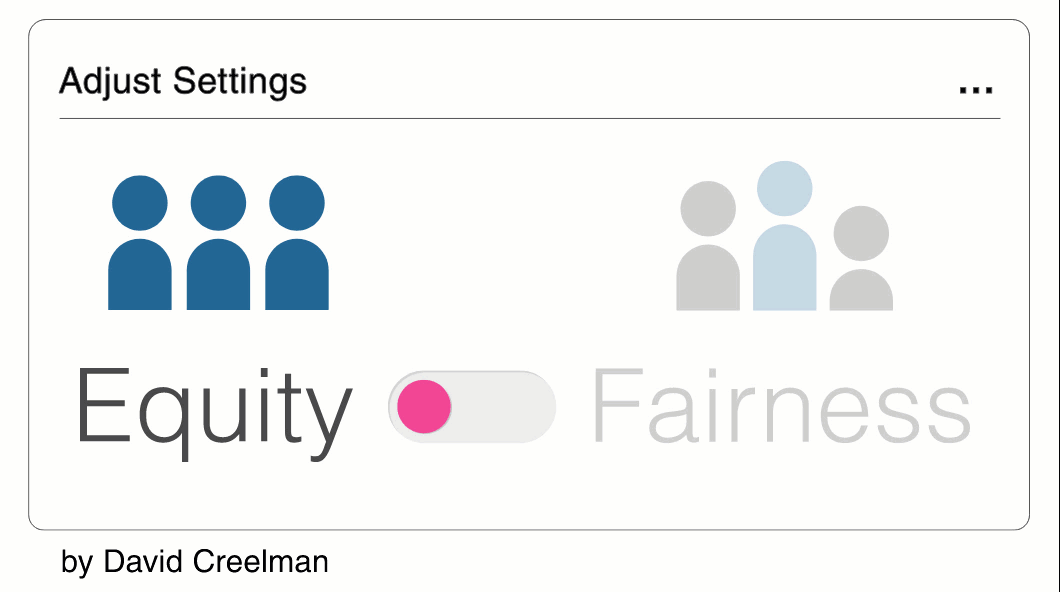
This is an article in an ongoing series by David Creelman about redesigning compensation planning to acquire and retain top performers. You can catch up on our previous discussions by clicking here.
It’s common for leaders to tell a compensation professional that pay needs to be fair and equitable. This puts the compensation pro in the uncomfortable position of asking, “Which one do you want?” Do comp professionals need to choose between equity or fairness?
The truth is that fairness and equity are not always compatible.
Equity vs Fairness?
In simple language, fairness and equity mean much the same thing. However, in the world of compensation, there are distinct meanings. Fairness refers to analysis at the level of the individual while equity refers to analysis at the level of a group. Fairness compares the compensation of person A to person B; equity compares the compensation of identity groups, such as men versus women.
In an ideal world, analysis at the individual and group level would lead to the same decisions about pay. In the real world, an analysis of fairness can lead to different pay outcomes than an analysis of equity which means you have to sacrifice one or the other.
Let’s see how this can happen. Let’s imagine you have a call center where employees are paid based on individual performance by objective metrics. Assuming that’s accomplish, then the pay is fair. However, you might discover that, on average, women are paid less than men which is an inequitable outcome. The difference in pay might be because women in our society have more child and eldercare duties which get in the way of work. For example, on average, men may be able to stay at work later and take fewer days off which will bump up their objective metrics. In this scenario, the average woman does have poorer performance metrics than the average man, but we could argue that it’s not their fault.
Social justice advocates say the world is full of structural inequities that lead to one identity group having poorer average performance on objective outcomes than others. Note that we are not talking about bias here. You can imagine a situation where men are paid more than women even if their performance is not better. That is unfair, as well as inequitable. Unfair situations are easy to deal with; we just fix them. The difficult case is when structural inequity puts some group at a disadvantage such that even though the pay is fair (i.e., same pay for same performance), that group earns less on average.
What should you do?
In any conflict between equity vs. fairness, the first step for a compensation professional is to consult the legal requirements in their jurisdiction. It is relatively easy to tell leaders we must do ‘X’ because it is legally required, even if you think ‘X’ is unfair or inequitable. In situations where the law leaves some flexibility that forces the organization to choose between being unfair or inequitable, it is up to the compensation professional to clearly explain to stakeholders that there is an uncomfortable choice to be made and no amount of arguing will make that discomfort go away.
Let’s take a case where we steer clear of gender politics to make our point. Imagine during a pandemic, your call center workers have to work from home. This situation proves very difficult for employees with kids who are now also at home, and their performance dips. A leader argues that we should show compassion for this identity group (those with kids) and give them their bonuses anyway. It’s hard to argue against showing compassion for a group facing some kind of structural inequity until you flip the perspective. Workers without kids will ask why they still need to hit their targets to get a bonus whereas those with kids do not.
Once again, the essential point is that there isn’t a happy answer. One reasonable way of looking at things (fairness) suggests one outcome, and another reasonable way of looking at things (equity) suggests another. There is always the option of finding a point in the middle at which point everyone is equally unhappy.
As a compensation professional, it’s not your job to repair unfixable problems. It’s your job to analyze your current situation, understand the law and its implications, have a good feel for how stakeholders will react to pay decisions, and communicate the appropriate information so clearly to leaders that they understand the tradeoffs they need to make (even when they’d rather not understand). When fairness and equity conflict what is the optimal answer? That’s a matter we’ll leave to your leaders to decide. ⬤

